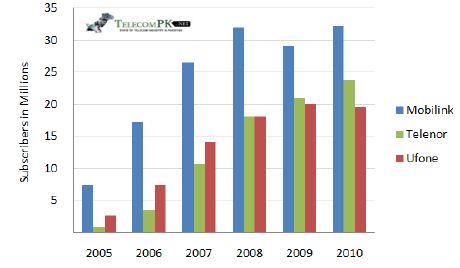Pakistan has now has 100 million mobile phone subscribers.
In a period of a decade Pakistan has gone from a country with minimal telecom infrastructure to a success story when it comes to telecom deregulation, attraction of foreign investment, contribution to economy and growth in subscriber base.
Consumers enjoy far more choices than ever before to select their telecom provider at home, office or for mobile. Prices for domestic and international calls are at their lowest point and broadband Internet cost is approaching the affordable mark. A large number of value added services are available.
Telecom sector has also become one of the major industries in Pakistan, contributing to revenue and leading in foreign investment. Telecom brands have become part of the daily lives of Pakistanis. The sector has been responsible for USF and ICT R&D Fund. Telecom sector has shaped the way corporate social responsibility is perceived in Pakistan. It has also played a vital role when disaster has struck Pakistan.
The sector has been very competitive. The top 3 mobile network operators have 75% of the market: Mobilink, Telenor and Ufone. The chart below gives you a glimpse into the battle for winning over consumers over the last 5 years.
So now that we have reached a major milestone of 100 million subscribers, should we pat our back and go back to business as usual?
Not so fast. I believe that this is just a starting point.
If we want to benefit from this initial growth and make it sustainable then we need to change our approach and step up our efforts to make better use of information and communication technologies. Even though the telecom sector of Pakistan has come a long way, it faces a number of challenges.
- Degradation in quality of network and customer service
- Aggressive price cutting and low ARPUs have made voice and text messaging a commodity
- Saturation of voice and not enough uptake on data services
- Over-emphasis and spending on advertisement
- Rapid shifts in communication modes have impacted our culture in ways which are not always positive
- Imports of phones has caused a strain on foreign reserves
- Digital divide in the country remains an issue
I would argue that the whole sector – private companies, schools and government – has fallen short on supporting research, innovation and creativity which could truly make a difference in the lives of people. In other words, we have reached the first milestone where a significant number of our population can make calls and send text messages. We are missing out on the REAL potential here. And believe me, this is not something that can be easily imported. We need to take this technology and create further value from it.
Engage our youth – the generation which has grown up using mobile phones – and show them productive ways to use communication technologies. My advice would be that The sector should focus on two things: provide economic benefits and to support education for the masses.
When Pakistan reached the 75 million mark in cell phone SIMS back in January 2008, Adil Najam had asked this question, which is still valid :
have we crossed some threshold of excessive cellphone ownership where, despite seemingly low costs, the marginal benefit of ownership no longer exceeds the marginal costs?
My answer is that it depends on what you do with this technology. Playing ring tones is fun but creating best-selling apps or solving problems using your phone is where we want to be. Where we need to be.
Babar Bhatti blogs at Telecom.Net. This post is exclusive to ATP.



















































So if we have this widespread infrastructure, that has been setup by mostly companies en rooted in foreign countries – making more than 60% of profit over their investments on a business that has more negatively affected the youth of the nation than anything else, we should be regretful of still not being able to have reliable connectivity as far as local services are concerned. The youth is busy composing SMS and making overnight calls that barely have a reason.
It is good to see the bright side, but only when the dark side doesn’t have monsters in it.
On a personal note, My father Sheikh Karim Bakhsh was the first telecom engineer responsible for installation of a telephone exchange in Pakistan at Lahore in 1947 after the British left the country during the partition. My brother, Abdul Khaliq Sheikh was responsible for installing first automatic exchange in Pakistan. He left the telephone department and retired honorably so that he does not have to deal with the whims of corrupt government of Mr. Bhutto. His son, Zouhair Khaliq, former CEO of Mobilink and responsible for unprecented growth of cell phone user left Pakistan after Mr. 10 percent took over. Corruption drove these guys away and they did not want a part of it.
Anyone who has seen Pakistan over the last ten years has seen the transformation in this sector it is everywhere. Sure, everything is not good. But everything is also not bad.
Again we are getting excited about numbers but it is really the bad service these companies give that should be the focus. They are all spending huge monies of ads and hooking customers in but spending nothing on customer service. Specially Telenor which is worst service and best ads. Actually, I now think that the better their ads are the worse there service is.
I used to also think that this mobile revolution was really a revolution. But it really has doing nothing for the country or economy and has created more problems than solved. Even in Africa mobile phones have started improving development, in Pakistan they have not.